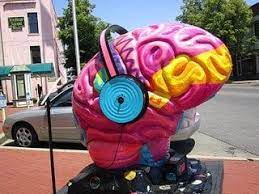I love music and listen to it often when I work. But I didn’t know how it affected my brain and body. Music is such an integral part of our lives that I thought it would be useful and interesting to look at how we respond to it.
Friedrich Nietzsche: “Without music life would be a mistake.”
Music has many different effects on the brain. As you can see from the image below, we are only scratching the surface. But let’s get in.
How we perceive neutral faces is affected by happy or sad music
Although we can often pick out if music is happy or sad, this is not a subjective feeling based on how it makes us feel. Our brains respond differently to sad and happy music.
Even a short piece of sad or happy music can affect us. A study found that participants were more likely than others to interpret a piece of music as either happy or sad. This was in line with the tone of the music. The most striking results were for expressions that were close to neutral.
Another interesting thing is how music affects our emotions.
Two types of emotions can be associated with music: perceiving and feeling emotions.
This means we sometimes understand the emotions in a piece of music but don’t feel them. This is why some people find sad music more enjoyable than depressing.
We don’t feel any danger or threat in listening to music. Therefore, we can perceive related emotions without actually feeling them. It is almost like experiencing vicarious emotions.
Creativity can be improved by ambient noise.
When tackling our daily tasks, it’s natural to turn up the music. However, when it comes down to creativity, loud music might not be the best choice.
It turns out that a moderate level of noise is the best place to express creativity. Low levels of ambient noise are more stimulating than high noise levels.
This works by increasing processing difficulty, which encourages abstract processing, which leads to greater creativity. This means that we can resort to more creative solutions when things are not as easy to process as they normally would.
However, creativity is affected by high levels of noise because we are overwhelmed and have a hard time processing information efficiently.
This is similar to how temperature, lighting and productivity can affect our productivity. However, living in a more crowded area can also be beneficial.
Music choices can help us predict who we will be
This one is for young adults only. However, it’s still very interesting.
A study with couples that spent time getting to know one another, looking at their top ten favorite songs provided reliable predictions about the listener’s personality characteristics.
Five personality traits were used in the study: openness to experiment, extraversion and agreeableness.
Some traits are more accurate than others based on the listener’s habits. Openness to experiment, extraversion, and emotional stability were the most difficult to predict. On the other hand, conscientiousness was not obvious based on musical taste.
Contrary to popular belief, music can distract us from driving.
A second study was done on teens and young adults to see how music affects driving.
The researchers provided music options for drivers to listen to, including their music or the “safe” music. Although their music was preferable, it proved more distracting than the other options. Drivers made greater mistakes and drove more aggressively while listening to their music.
Music training can greatly improve motor and reasoning skills.
Although we assume that musical instruments can be beneficial to children, it is more useful than we think. One study showed that children with three years of musical instrument training did better than those without. It also revealed that children who had more time learning an instrument were better in fine motor skills and auditory discrimination skills.
Classical music can increase visual attention.
Music exposure and training can be beneficial for more than just children. Stroke patients showed increased visual attention when listening to classical music.
To compare the results, the study also tested white noise and silence. It found that silence had the lowest scores, just like the driving study.
This study was small, and the results need to be confirmed. However, I find it fascinating how music and noise affect other senses and abilities, in this case, vision.
Distracting phone calls can be more disruptive than normal conversations.
Another study that focused on noise rather than music showed that phone calls in which we can only hear one side of a conversation are the most distracting.
Participants completed word puzzles while the other half listened to the background conversation of a simple phone conversation. Half of the volunteers listened to the entire conversation between the two participants.
Music helps us exercise.
We can return to music and see that it is not useful when exercising.
For years, research has been conducted on music’s effects on exercise. Leonard Ayres, an American researcher, discovered that cyclists could pedal faster when listening to music than they did in silence.
Because music can drown out the brain’s fatigue cries, this happens. When our bodies realize we are tired, they send signals to the brain to take a rest. Music can compete for our brain’s attention and help us overcome those signs of fatigue. However, this is only beneficial for moderate and low-intensity exercise. Music isn’t as effective at distracting our attention from the pain during high-intensity exercises.

